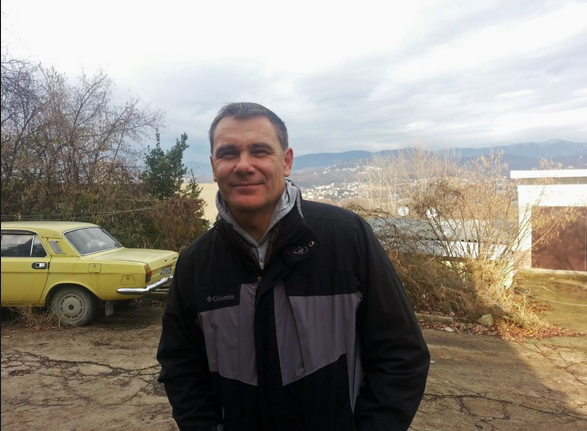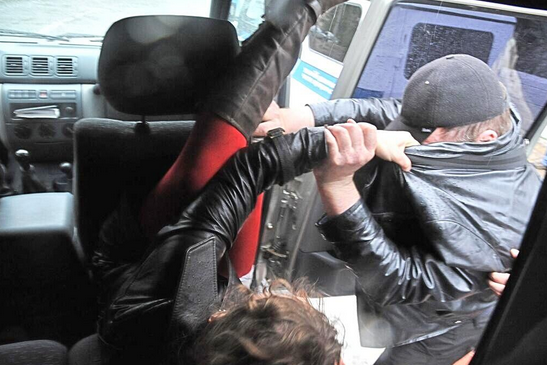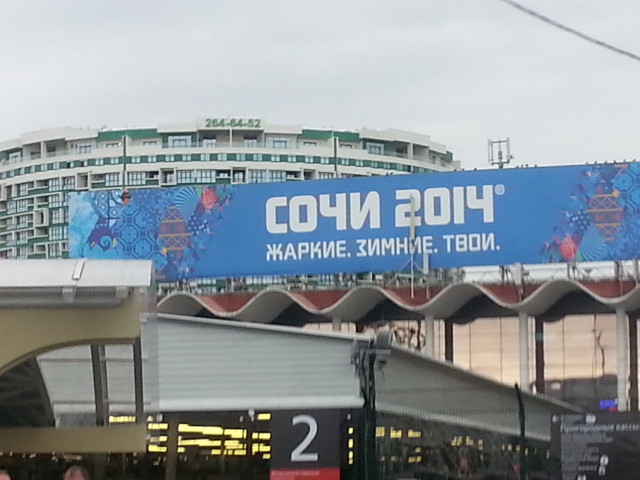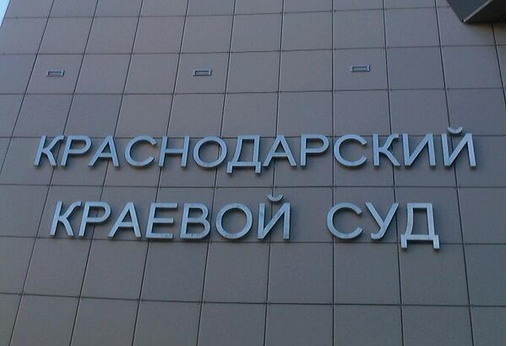
Arctic Frontiers: Disinformation, Security and the Northern Sea Route
Bellona held a seminar on countering Russian disinformation in the Arctic at the Arctic Frontiers international conference in Norway
News

Publish date: February 18, 2014
News
Yevgeny Vitishko, the Russian environmentalist who drew damning attention to gross ecological violations surrounding the Sochi 2014 Olympics today was transferred from administrative custody to an unknown prison colony to serve three years for spray-painting a fence.
But for several hours, he his whereabouts were completely unknown to activists, his family and police and corrections officials refused to discuss it. His release from jail in Tuapse, 72 kilometers northwest of Sochi – where he was held for 15 days on trumped up charges of swearing in public – was supposed to have occurred at 1:20 pm local time.
He would have then been allowed to return to his home, see his family and collect his personal affairs before being transferred to the prison colony for the next three years.

Instead, it was finally tentatively confirmed three hours later that he had been transferred earlier in the day to Krasnodar, the capital of the Russian region where the Olympics are being held – a violation of the conditions of his transfer as established by the Krasnodar regional court on February 12.
Judges in Krasnodar said Vitishko would not only be allowed to return home prior to going to the penal colony, but that he would be released from the Tuapse jail on his own recognizance to see his family, collect his things and then turn himself into penal colony correctional officials.
According to Dmitry Shevchenko, a fellow activist of Vitishko’s at the Environmental Watch on the North Caucasus, Vitishko should have been released at 1:20. Activists and well wishers as well as Norway’s TV2 had gathered for his release.
But when he failed to appear, no one could get a straight answer from jail officials as to Vitishko’s whereabouts.
Shevchenko told Bellona in a telephone interview that Vasily Vinishenko, the head of the local detention center in Tuapse where Vitishko was being held, told waiting activists that Vitishko had already been sent to Krasnodar.
During a call to the duty officer at the Tuapse jail by Shevchenko, he was told Vitishko was still in the custody of the detention facility.
The duty officer told Shevchenko in yet a later telephone call to the jail that Vitishko had been released at 1:24 pm local time.
At the same time, Vitishko’s wife, Larisa, received a call from the Tuapse jail. She told Bellona that a duty officer there had informed her Vitishko had been freed, but then immediately detained again.
Øystein Bogen, a reporter with TV2 news in Norway, who had been sent to cover the release of Vitishko, posted on his twitter account at 2:10 pm local time that, “Vitisko vanished without a trace from remand detention in Tuapse. The police cannot account for where he is.”
Calls by Bellona to the Tuapse jail asking about Vitishko’s whereabouts were answered with a clipped “no comment,” and the calls immediately terminated.
Tranfer intentionally bungled
Shevchnko thought something might foul up the smooth transfer.
In his interview earlier in the day with Bellona, he said: “There’s reason to believe that they have no intention of releasing Yevgeny, but rather intend to send him directly to the penal colony,” he said by telephone.
By the end of the day, EWNC’s Andrei Rudomakha released a statement saying that the group had confirmed Vitishko had been transferred illegally to Krasnodar, and was from there headed to a penal colony. Rudomakha said that no one knew what prison colony Vitishko would be sent to, information that should have been available at least since his appeal was turned down on February 12.
High profile detention in Sochi draws spotlight away from Vitishko
During the stumbling confusion in Tuapse, Nadya Tolokonnikova and Masha Alyokhina of the punk collective Pussy Riot, who were released from prison in a cynical pre-Olympics amnesty of political prisoners by President Vladimir Putin, were picked up by police in Sochi on suspicion of stealing purses, police told them. Another report from the state run RIA Novosti agency, said the two had been picked up on suspicion of stealing from the hotel in which they are staying.

Tolokonnikova is a vocal opponent of the Sochi Olympics, and declared they should be boycotted within minutes of being released from her penal colony in Siberia.
When reached by Bellona on her mobile phone the Adler district police station, near Sochi, Tolkonnikova emotionally said,” yes, definitely,” when asked if she thought her detention was orchestrated to distract from the Vitishko matter.
“We have been here in Sochi for three days under constant surveillance, dealing with constant document checks. So why would we have been arrested today? The answer is simple,” she told Bellona.
Tolokonnikova also said from the police station that police were trying to force her and Alyokhina to sign confessions without a lawyer present and were accused of theft. Eventually, her telephone was pulled away from her, presumably by an officer on duty.
When Bellona reached her again several minutes later, she indicated the situation had not changed at the police station, and she had no idea when she and her bandmate would be released. She confirmed that the police had been beating her and her band mate and that the violence did not end until their lawyer arrived. That lawyer was Alexander Popkov, Vitishko’s lawyer, who has by default become Sochi’s local go-to lawyer for activists of all stripes.
At the time of Tolokonnikova and Alyokhina’s detention today, Tolokonnikova said they had simply been driving around Sochi on their way to a McDonald’s. But each day they had been in the Olympic city, she said, and Popkov confirmed, that they had been stopped for document checks. On their first day in Sochi, on February 16, the duo had been asked to produce their documents by police during an afternoon stop. They were hauled into a local precinct, and not let go until 3 am.
The next day they were stopped and detained with EWNC activist and lawyer Olga Noskovets, and a number of other activists for allegedly violating security borders around Sochi, near the disputed territory of Abkhazia. Police demanded they all produce their international passports, but Noskovets, who was driving, explained she had taken an honest wrong turn. Noskovets, the Pussy Riot members and activists were detained and let go.
Tolokonnokova told Bellona that she and Alyokhina were in Sochi in hopes of filming a video their new song “Putin Will Teach You to Love the Motherland,” a song she said is “dedicated to prisoners of the swamp [referring to a May 2012 political protest that turned violent in Moscow’s Bolotnaya Square], corrupt Olympics, Vitishko and suppressed freedoms in Russia.”
By 6pm Sochi time, after some five hours of detention, Tolokonnikova confirmed to Bellona by telephone that she and Alyokhina had been freed without charge. They were later treated for bruises and abrasions at a local hospital, she said.
Pussy Riot had been jailed after staging a 40-second long guerilla rendition of their punk “hymn” begging the “Mother of God” to “chase Putin out” at Moscow’s Christ the Savoir cathedral in February 2012.
One ridiculous imprisonment after another
Vitishko’s imprisonment has caused outrage among environmental and rights activists across Russia, and spurred Games-time meetings between Norwegian Prime Minister Erna Solberg and Russian Prime Minister Dmitry Medvedev to raise the issue of human rights at Sochi 2014 – but to no avail.
Amnesty International has declared Vitishko a prisoner of conscience, and Human Rights Watch, the Norwegian Helsinki Committee and Bellona have demanded his release. Meanwhile, hundreds of online petitions posted by ordinary citizens both in Russia and abroad have sprung up across social media.
Vitishko and EWNC, have been instrumental in bringing to light the vastness of ecological devastation brought about by the Sochi Olympics and President Vladimir Putin’s heavy-handed drive to show “the modern Russia” to the world.

Last week, they released a damning environmental report on the Olympics in Moscow, after several clashes with the policy and secret services made it impossible for them to release it in Sochi.
The group itself has been under siege by police and special services, and it is widely believed that Vitishko’s harsh punishment on what activists say are trumped up charges are an overt effort by the Kremlin to cut the vocal chords of the Olympics’ most eloquent critic.
The NGO community has pleaded with the The International Olympic Committee to intercede on Vitishko behalf, but to no avail. The IOC’s chief spokesman, Mark Adams, however, has said that Vitishko’s imprisonment is not “Games-related” despite Vitishko’s energetic environmental lobbying against Olympic construction that by-passed environmental impact studies, it’s encroachment into the Sochi National Forest and the Imeritisnk protected Wetlands, and the poisoning of Sochi’t drinking water that has occurred as a result of illegal landfills and an enormous highway and rail line project linking the Sochi seafront to the mountain skiing venues.
The detention of Vitishko that is expiring today is administrative incarceration for swearing in public, an accusation he was jailed for on February 3 after two anonymous witnesses submitted written statements.
Vitishko was not allowed a lawyer during these proceedings, and his fellow activists and Bellona say that the swearing charges brought against him are completely bogus, and were simply a way to keep him away from international media and from attending to the details of putting out the final draft of EWNC’s scathing report on ecological damages caused by Sochi 2014. The report, available in Russian, will be released in English within a week.

Today Vitishko was to be released to a prison colony to which he was sentenced by the Krasnodar court on February 12. That court proceeding, which Vitishko was allowed to attend only via scratch television link, was an appellate hearing of the Tuapse court’s decision on December 21 to convert a three-year suspended sentence to which Vitishko was subject for the fence incident in 2012, to a custodial sentence.
Vitishko’s lawyer immediately appealed the verdict, and Vitishko was allowed to remain free during until his appeal, which was initially scheduled for February 22.
After he was picked up on the public swearing charges, however, his appellate hearing in Krasnodar was moved back to February 12, in a move his lawyer, Alexander Popkov, said was meant to ensure Vitishko could not be present to speak in his own defense.

Bellona held a seminar on countering Russian disinformation in the Arctic at the Arctic Frontiers international conference in Norway

Our December Nuclear Digest, reported by Bellona’s Environmental Transparency Center, is out now. Here’s a quick taste of three nuclear issues arisin...

Bellona has launched the Oslofjord Kelp Park, a pilot kelp cultivation facility outside Slemmestad, about 30 kilometers southwest of Oslo, aimed at r...

Our November Nuclear Digest by Bellona’s Environmental Transparency Center is out now. Here’s a quick taste of just three nuclear issues arising in U...